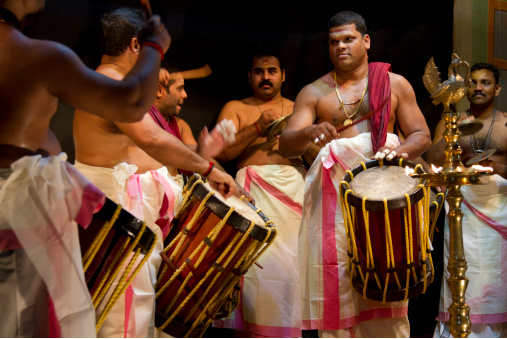Apr 18, 2025
Apr 18, 2025

From the ages of yore, music and devotion are embedded within each other in Indian tradition. Devotion, bhakti is the inherent nature of the soul that is usually suppressed due to worldly illusions. Music is also instilled within the soul as it is part and parcel of the supreme, but only a few manage to realize and utilize it. These two divine aspects complement each other and are generally found to be incomplete without one another.
Music has been mentioned as an integral part of devotional practices through a wide range of scriptures. When any methodology of worship is described in Indian culture, music is mentioned as a necessity. Prayers in India are considered complete only after an offering of a musical presentation.
Across India, it is important in all temples that along with all other rituals, a specific time is allocated for music offerings – gana seva. Be it strict classical singing or just the simple outpour of devotion of folk devotees, no temple of Indian origin will be found without the presence of music. During the aarti ceremony in all temples, it is ritualistic to sing the praises of the presiding deity. Some temples actually involve the singing process as other offerings and rituals are carried out in the sanctum sanctorum. The temples of Vrindavan are a perfect example of this. Other temples like the Sankat Mochan temple in Varanasi are always resounding with music in terms of continuous keertana. In South Indian temples, when the deity is taken out for the purappadu, music and musical instruments form to be a crucial part of the festival. Temples like Guruvayur and Tirupati specifically hold music festivals for many days. Prominent singers go to perform at the temples and sacred spots during festivals to offer their music with all humble devotion.
Lord Krishna explains to Sri Uddhava, the methods of worship in Srimad Bhagavatam. He describes all the different aspects of worship and rituals. Herein, the Lord mentions:
Upagayan grnan nrityan (11:27:44)
‘Sing of my pastimes, recite about them and portray them through various performances like dance.’
This is the Lord’s instruction that the devotee should explicitly sing about his glories. On another occasion, according to Padma Purana, Lord Vishnu speaks to Sri Narad muni and says:
Madbhakta yatra gayanti, tatra tishthami narada
‘Wherever my devotee sings of my glories, I reside there’
Therefore, it is clear that singing is especially very dear to the Lord. And thus very naturally, every devotee tends to please the Lord through music. This music may be simple traditional songs or strict classical compositions. In either case, it is means to communicate with the supreme. If looked at in detail, every musical composition of cultural India, whether folk or classical, is directly related to spiritualism.
Devotion or bhakti is intrinsically always present in music. From the yester years, music has forever been an expression of ultimate devotion. Ranging from bandishes, thumris, bhajans to general colloquial music, music represents devotion – a symbolism of surrender to the supreme Lord.
In classical music, the musical notes, alaaps and lyrics are all devotional. Various ragas sung at specific times, signify a deep meditation and penance. The permutations and combinations of the musical notes for the different ragas rise the mental level of the performer as well as the audience to a high spiritual platform. In this way, a musical performance creates a devotional environment.
All the ragas of classical music are deeply related to nature. Nature – the most beautiful creation of the Lord, can be invoked my music. Ragas like megh are well known to be sung for the arrical of clouds and rain. Vrindavani sarang is a raga that vividly attracts animals like deers from miles away. Raga deep exaggerates temperature while the malhars cool it down. Different moods are brought about by the different ragas that relate the individual to the supreme. Moods of tranquility, love, anger, praise, anxiety and yearning for the Lord are instantaneously arisen in the mind of the individual through Indian classical music. The seven notes of music have been praised as syllables that directly relate to the Lord and hence they are known as swara-brahma by the knowledgeable preceptors and sages. Initially practiced by the divinities in the heveanly planets for the pleasure of the supreme, classical music has been brought down to the present day through an unbroken lineage consisting of great sages, saints and gurus.
It is very unfortunate that in the current era, our highly divine and spiritual performing arts are being exploited for material sense gratification. This is making our art forms lose their integrity as we lower them to unbelievable levels. It is very necessary that our classical arts are practiced in the correct way and utilized for total spiritual purposes. Music in essence is an act of devotion and devotion is incomplete without the presence of music. Such is the greatness of our traditional culture, even entertainment elevates you!
Image (c) Gettyimages.com
08-Oct-2013
More by : Ojaswita Chaturvedi